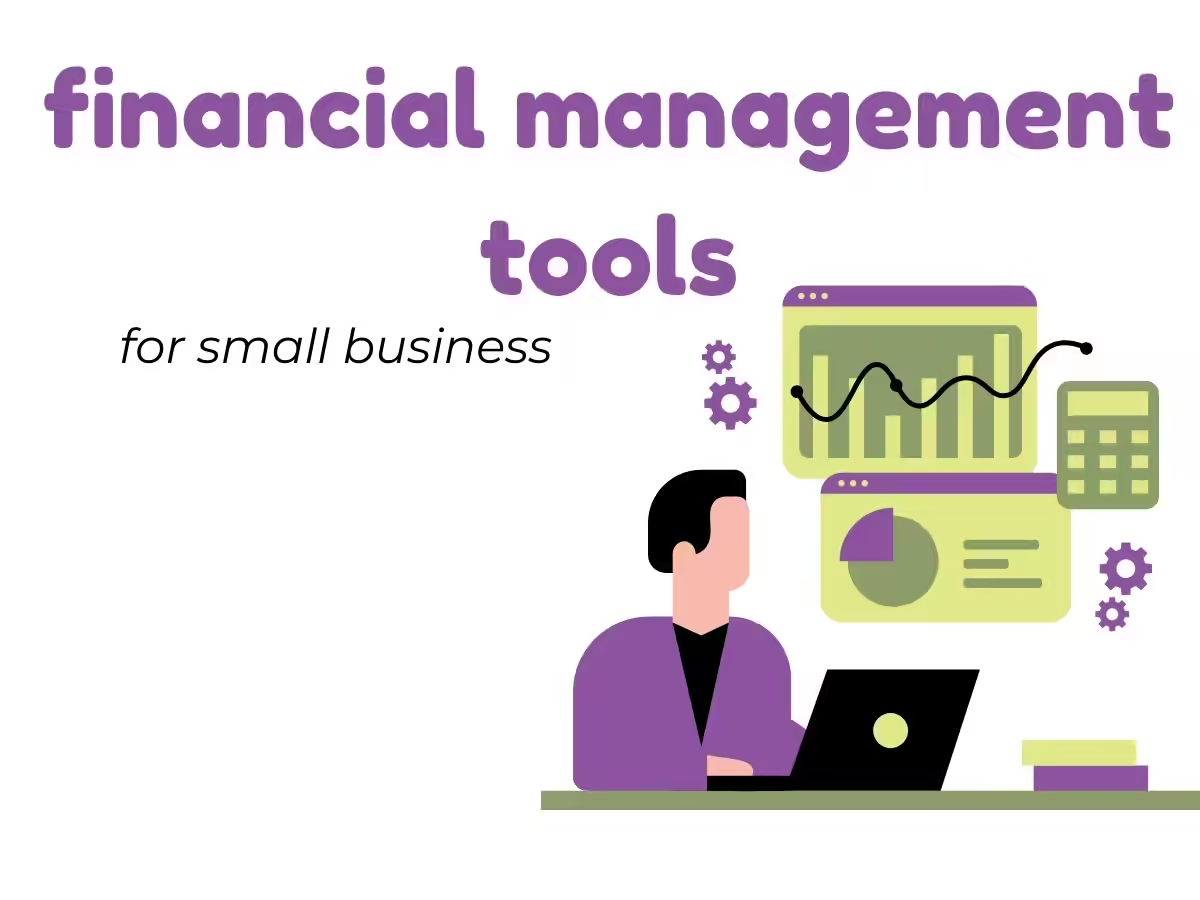Financial Management Tools for Small Businesses: A Comprehensive Guide
In today’s competitive business environment, financial management tools for small businesses are crucial to help business owners keep track of their finances, make informed decisions, and drive growth. Proper financial management is essential for every small business to ensure cash flow, profitability, and long-term sustainability. Leveraging the right tools can streamline everything from budgeting and invoicing to tax management and payroll processing.
This article delves into the top financial management tools for small businesses, explaining their importance, how to use them effectively, and why they’re essential for small business success.

Table of Contents
Introduction: The Importance of Financial Management Tools for Small Businesses
In the fast-paced world of entrepreneurship, financial management is the cornerstone of success. Effective financial oversight is especially critical for small businesses, where every decision can have a significant impact on the company’s bottom line. Financial management tools for small businesses simplify the process of tracking expenses, managing cash flow, and ensuring the business remains profitable and compliant with financial regulations.
With the rise of cloud computing, automation, and integrated platforms, business owners now have access to a wide variety of finance tools for business. These tools not only reduce the administrative burden but also provide insights that can drive strategic decision-making.
The Role of Financial Management in Small Business Success

Financial management plays a pivotal role in the sustainability and growth of a small business. Without proper management of finances, small businesses risk misallocating resources, overspending, and facing cash flow problems. There are several key financial functions that small businesses need to focus on:
- Budgeting and Forecasting: Creating an accurate budget is essential for monitoring cash flow and ensuring that expenses are kept in check. Financial management tools can help small business owners project future income and expenses to avoid financial pitfalls.
- Expense Tracking: Keeping an accurate record of business expenses is crucial for tax purposes and for understanding where money is being spent. Digital tools make this process easier by automating expense tracking and categorization.
- Invoicing and Payments: Small businesses must ensure that they receive timely payments from clients and customers. Invoicing tools help manage billing efficiently and send reminders for unpaid invoices.
- Tax Preparation: Tax season can be stressful, but financial management tools streamline the process of tracking deductible expenses, calculating tax obligations, and preparing filings.
Best Financial Management Tools for Small Businesses

1. QuickBooks
QuickBooks is one of the most widely used financial management tools for small businesses due to its user-friendly interface and robust features. It offers solutions for accounting, payroll, invoicing, and tax management. Key benefits include:
- Easy-to-use accounting features: QuickBooks allows users to easily track income, expenses, and profit, generating financial reports with a few clicks.
- Integration with banks: QuickBooks syncs with business bank accounts, making it easy to track transactions automatically.
- Invoicing and payments: QuickBooks offers custom invoicing solutions with the option for clients to pay online, which speeds up payment collection.
2. Xero
Xero is a cloud-based accounting software designed for small businesses. It offers a suite of tools that simplify bookkeeping, invoicing, and tax filing.
- Automatic bank feeds: Xero allows users to connect their bank accounts, credit cards, and PayPal accounts, making it easier to reconcile transactions.
- Customizable reporting: Businesses can generate customized reports that provide insights into financial health, helping owners make data-driven decisions.
- Payroll integration: Xero integrates with payroll systems to manage employee payments and taxes seamlessly.
3. FreshBooks
FreshBooks is an accounting and invoicing software designed for freelancers and small businesses. Its ease of use and emphasis on invoicing make it a popular choice.
- Automated invoicing: FreshBooks automates the invoicing process and allows clients to pay directly via credit card or ACH payments.
- Expense tracking: FreshBooks allows businesses to categorize expenses easily and track how much is being spent.
- Time tracking: For service-based businesses, FreshBooks provides a time-tracking tool that makes billing clients for hours worked simple and accurate.
4. Wave
Wave is a free financial management software that offers accounting, invoicing, and receipt scanning. It’s ideal for startups and small businesses on a budget.
- Free accounting software: Wave provides core accounting services at no cost, making it accessible to small businesses and solopreneurs.
- Invoicing and payments: Businesses can send professional-looking invoices and accept credit card payments directly through the platform.
- Bank reconciliation: Like other accounting software, Wave offers the ability to connect bank accounts and reconcile transactions.
5. Zoho Books
Zoho Books is an affordable and comprehensive financial management tool for small businesses. It covers a wide range of functions, including billing, invoicing, and accounting.
- Collaboration: Zoho Books allows business owners to collaborate with their accountants and other stakeholders by giving them role-based access to the system.
- Automation: Zoho Books helps automate repetitive tasks such as payment reminders, invoice generation, and reporting.
- Inventory management: For businesses with physical products, Zoho Books provides inventory tracking, enabling users to manage stock levels efficiently.
How to Choose the Right Financial Management Tool for Your Business
Choosing the right finance tools for business depends on several factors:
- Business Size and Complexity: A simple invoicing tool may suffice for a freelancer, while a small business with multiple employees may need more comprehensive accounting and payroll management solutions.
- Budget: Some financial tools, like Wave, are free, while others, like QuickBooks, require a monthly subscription. Business owners must evaluate their budget and choose a tool that fits within their financial plan.
- Industry Requirements: Certain industries, such as retail or construction, may require specialized financial management tools. Be sure to consider any unique accounting or reporting needs when selecting software.
- Integration Capabilities: It’s essential to choose a tool that integrates seamlessly with other business systems, such as payment processors, CRM platforms, and payroll software.
How Financial Management Tools Improve Efficiency
The right financial management tools for small businesses can significantly improve operational efficiency by automating tedious financial tasks, reducing human error, and ensuring data accuracy. Here’s how these tools boost efficiency:
1. Automation
Many financial tools automate tasks such as sending invoices, generating reports, and tracking expenses, allowing business owners to focus on growth and strategy rather than manual data entry.
2. Real-Time Insights
Financial tools provide real-time data and analytics, enabling business owners to make quick, informed decisions. For example, having an updated cash flow statement at your fingertips allows you to identify potential liquidity issues before they become problems.
3. Streamlined Tax Preparation
Keeping financial records up to date throughout the year makes tax season significantly less stressful. Tools that automatically categorize expenses and track income make it easier to file taxes accurately and on time.
4. Improved Cash Flow Management
Many small businesses struggle with cash flow issues, especially in their early stages. Financial management tools provide insights into cash flow patterns, helping business owners identify periods of low cash reserves and plan accordingly.
5. Reduced Errors
Human error is a common issue in manual accounting. Financial tools minimize errors by automating calculations and data entry, ensuring that records are accurate and up-to-date.
Creating a Customer Loyalty Program Template for Your Business
Once you’ve chosen your financial management tools, integrating these systems into your daily business operations will help streamline your finances, giving you more time to focus on other important aspects, like customer retention.
Conclusion: The Key to Financial Success in Small Businesses
Mastering financial management is one of the most critical aspects of running a successful small business. Utilizing the right financial management tools for small businesses can simplify accounting, improve cash flow, and ensure the business remains profitable and sustainable in the long term. From tracking expenses to automating invoicing and tax preparation, the tools available today offer a wide range of solutions to meet the needs of small businesses across all industries.
As a small business owner, choosing the right tools can be the difference between surviving and thriving in today’s competitive landscape. If you want to take your business to the next level in 2024, check out our detailed guide on the Top 5 Must-Have Tools for Small Business Success in 2024. These tools will streamline your operations, boost productivity, and help you stay ahead of the competition. Discover which tools can empower your small business to achieve new heights!
References
- QuickBooks Official Site – https://quickbooks.intuit.com
- Xero Official Site – https://www.xero.com
- FreshBooks Official Site – https://www.freshbooks.com
- Wave Official Site – https://www.waveapps.com
- Zoho Books Official Site – https://www.zoho.com/books

1 thought on “financial management tools for small business”